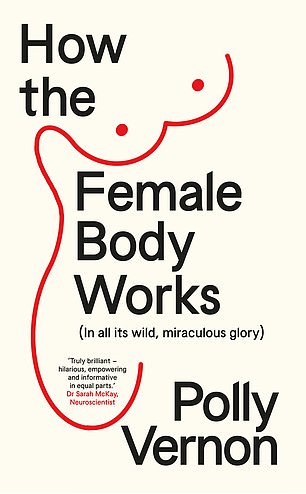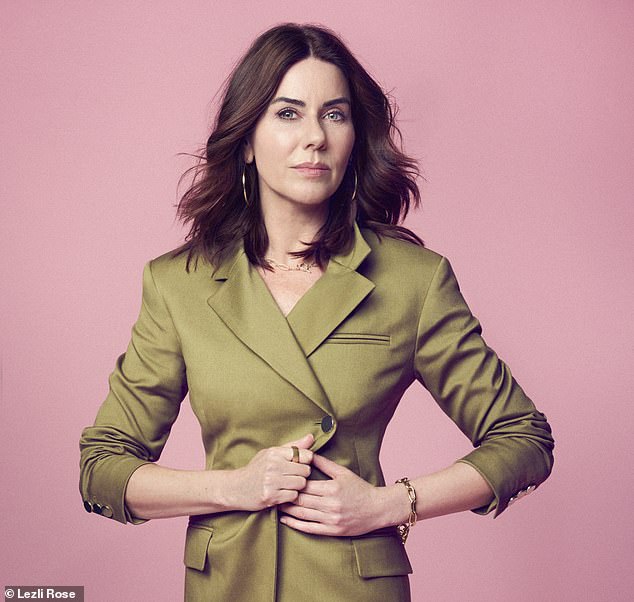How much do you know about the female body? Your body? Or your friend’s, your sister’s, your daughter’s?
Oh, you know the one! It’s considered softer, ‘fairer’; more vulnerable but also, more capable of enduring pain. It bleeds on purpose sometimes, it can get pregnant at others, it’s both fetishised and derided (often by the same people, at the same time), and it belongs to 49.74 per cent of the world’s population.
For example: Do you know what a female sex hormone is? Or any hormone for that matter – what they look like, how they operate?
What they want from us? Are they really our diabolical overlords, capable of manipulating our bodies and our personalities on an unknowable whim? Or are they on-side? Friendly, even?
And what’s a brain exactly? Is a female brain distinct from a male brain? Does that explain why we’re twice as likely to be diagnosed with depression and Alzheimer’s? Did you know women are twice as likely to be diagnosed with Alzheimer’s?
How about menopause? Is it puberty in reverse? An initially slow, but then increasingly speedy luge run toward pointlessness, social invisibility, fury, flushes, divorce and death?
Or is it actually not that at all? Because, you know, women have been known to win Nobel prizes after the menopause.
I didn’t know. Didn’t know any of it. For years, I’d driven my body around like it was a car – and I had zero interest in the manual. Then, one day last year, I found myself in the haematology department of my local hospital in north London waiting for a blood test. I was due to start taking a drug to cure a dose of toenail fungus – sexy I know – and this drug was hardcore enough that my liver function needed to be assessed in advance.

Polly Vernon found herself questioning adverts covering the walls of the Tube station she was waiting in – one in three were targeted towards women’s health and issues

Does arome de oestrogen exist? Yes there is, according to a 2019 study, in which men were asked to rate 28 women of reproductive age in order of the attractiveness of their smell
There were forty-ish people in the waiting room with me, all ages, all ethnicities, all shapes and sizes and clothing choices and so on, but… just the one gender.
We were all female. Every last one of us. ‘What’s this about?’ I wondered.
Later that day I loitered on the Tube platform, waiting for my train, half-heartedly reading the billboard adverts covering the walls. I suddenly realised that one in three of them – maybe more – were offering private diagnostic tests.
There was everything from fertility tests, menopause-related hormone tests, immune system tests to thyroid function.
All these tests! And almost all of them very obviously aimed at women. Tests designed to check every aspect of us, to pinpoint potential failings and deficiencies, and name and quantify future risks we hadn’t even considered yet.
Suddenly, wherever I went, all I heard was chat about women’s bodies.
A feminist mate told me ‘there’s more research into male pattern baldness than there is into all aspects of women’s health combined’. My GP sang the praises of HRT – ‘but isn’t it dangerous?’ I replied – and said that women in their 50s and 60s were seeing some of the highest rates of sexually transmitted infection.
So much of it was confusing and contradictory and overwhelming. I really did need a manual.
I’m a journalist, an interviewer by trade. I’ve interviewed everyone from Harry Styles to Donald Trump to Gwyneth Paltrow. Interviewing is something I love doing; lifting the bonnet on someone else’s mind, having a good old rummage, seeing who they are and what they know. It’s one of the few things I’m qualified to do.
So – I start thinking – what if I were to apply my interview techniques to a load of experts on women’s bodies? Neuroscientists, academics, medical specialists, midwives, gynaes, psychologists and physios?
What if I were to collate… Not just the textbook knowledge, but also the evolving theses, observations and personal experiences of a bunch of people who have dedicated their professional lives to women’s bodies?
So that’s what I did. And now I’ve published it all in my new book, How The Female Body Works.
Here are ten of the little gems and nuggets of hitherto unknown knowledge I gleaned along the way. Bet you didn’t know them either…
Why menopausal women get hot flushes
I turn to hormone specialist Dr Nicky Keay for this one. One theory, she tells me, says it’s all to do with the conductors of the hormonal orchestra – the pituitary gland and the hypothalamus – which lie at the base of the brain.
When a woman reaches menopause, her egg supply has dwindled almost to nothing and she’s no longer able to regularly ovulate. For a while, however, these controllers still attempt to chivvy the ovaries into action by pumping out two egg-stimulating hormones – FSH (follicle-stimulating hormone) and LH (luteinising hormone) – as if they can force them into action. ‘The conductor of the endocrine orchestra, the pituitary gland, gets very cross with the ovaries. ‘You’re slacking! What are you doing?’,’ says Dr Keay.
But there’s a side-effect of this. Because the pituitary and hypothalamus also act as the body’s thermostat, constantly checking and adjusting its temperature, the brain’s efforts to get the ovaries producing eggs – something they can no longer do – now raises the body’s temperature. And boom – a hot flush hits. Or that’s the theory.
‘Why ever they happen, the point is,’ Dr Keay goes on, ‘you feel out of control and horrible… typically in the middle of a work meeting.’
Why your breasts could account for almost half a stone when you step on the scales!
If you’ve ever wondered – and most women have – B cup breasts weigh around 10oz each, a C cup, around 1lb each, D: around 1lb 8oz each, while DD/E cup boobs can weigh anywhere between 1lb 8oz and 3lb each!
Why a woman might overlook an unwashed mug in the sink before day 14 of her menstrual cycle… but won’t after it
This is all to do with the hormone oestrogen, which builds in the first phase of the menstrual cycle. Oestrogen makes you ‘more positive, more energised’, says Maisie Hill, menstrual health expert and author of Period Power. In this first phase: ‘We’re more out in the world, going out, curious, interested, flirty…Whether you want to conceive or not, your body, your hormones, are driving you towards mating behaviour.’
Which is also why oestrogen ‘doesn’t want you focused on the pile of dirty dishes your partner has left’, Maisie goes on, ‘because then, you’re not going to want to have sex with them.’
In the second half of the cycle, however, oestrogen falls back, progesterone surges and, well, ‘the rose-tinted glasses are off…’
That’s when we see the details that bother us – the ones we were able to gloss over before. If you’re more critical of your partner – and self-critical – during the last two weeks of your cycle, that’s down to your hormones.
Why you might get the menopause early if you are stressed
A constant release of the stress hormone cortisol through earlier life can disrupt the production of oestrogen and progesterone, says Dr Keay. This is why stress can cause interruptions in a regular menstrual cycle and ultimately be a factor in preventing a woman from conceiving.
It now seems excess cortisol might also hasten the onset of menopause by up to four years. It’s a bit of a vicious circle, too – falling oestrogen during menopause can also cause anxiety, which can make you more vulnerable to stress.
Why your hangover is worse the older you get

Polly Vernon published her findings in her new book, How The Female Body Works
It feels horribly unfair, but women are affected by alcohol more than men. ‘We have more body fat than men, so the rate at which we metabolise alcohol is slower,’ research fellow in behavioural science and health at University College London Dr Sharon Cox tells me. ‘If we drink the same as men, we will get more unwell.’
Moreover, as we get older, we find it harder again to metabolise alcohol, so hangovers become worse. This is exacerbated during the menopause, when our oestrogen levels drop. But it’s not just a physical phenomenon. Dr Sally Adams, assistant professor in health psychology at the University of Bath has found that as women get older, they start to feel more guilty about drinking and to subjectively rate their hangovers as worse than they used to be. More guilty than when we were younger? ‘And more guilty about drinking than men,’ she says.
So our hangovers, or at least our perception of their severity, might be a form of self-punishment? We’re sort of making ourselves feel worse? Or perhaps, experiencing our guilt as physical pain? Because we think we’re too old to be behaving like this?
‘Yes! And then, there’s another twist to this, which is: women who’ve had children, regardless of their age, also report feeling more guilt and more pain when they’re hungover. It’s likely the feeling of guilt is intertwined with pain. ‘I’m in pain because I feel ashamed, I feel ashamed because I’m in pain’.’
Perhaps, then, if we stopped feeling so bad about it, we’d stop feeling so bad.
Why men can smell female sex hormones
Is there such a thing as arome de oestrogen? Well, yes there is, according to an (admittedly small) study from the University of Zurich in 2019, in which men were asked to rate 28 women of reproductive age in order of the attractiveness of their smell.
All the study subjects chose women who, previous tests indicated, possessed the highest levels of oestrogen. Another study by researchers at Yale University, published in 2020, also concluded that women smell different when they are most fertile.
Why baby brain is real, but not in the way you think it is
The brain in pregnancy goes into ‘a state of plasticity’, according to Dr Sarah McKay, author of The Woman’s Brain Book. Meaning? ‘That it’s super sensitive to learning and change.’
Just as at puberty, a significant pruning of grey matter takes place during pregnancy, which counter-intuitively allows speedier connections between nerve cells, making you smarterand sharper.
The reason? To very quickly learn how to interpret what our imminently-arriving baby needs and wants.
This change, Dr McKay says, is driven ‘particularly in the third trimester’ by oestradiol, that especially potent hormonal subtype of oestrogen, which ‘is at sky-high levels during pregnancy’.

Polly wondered what she might unveil about the female body if she started interviewing more medical, academic and psychological experts
‘If you have a pregnancy, you’ll get a thousand times more oestrogen than you’ll receive in the entire rest of your life. And that’s a good thing, because oestrogen is a good hormone, our brains really like it. It builds [brain] resilience, and – particularly during pregnancy – it’s driving the social brain rewiring.’
These changes, this rewiring, Dr McKay thinks, is routinely misconstrued.
Pregnant women, and women who have given birth and are now raising newborns, are often assumed to be cognitively lesser, when in fact, they’re demonstrably sharper. This, then, is the real definition of ‘baby brain’.
Why breast milk varies according to the time of day – and the weather
Can newborns somehow communicate with their mothers’ bodies to influence the very make-up of their milk? Or is that Googled-up rubbish?
‘The nutrients in breast milk vary for lots of different reasons,’ says Dr Philippa Kaye, a GP, former sexual health advisor for Ann Summers, and most pertinently in this instance, author of the brilliant Breasts: An Owner’s Guide. In the kind of hot weather we’ve been having, for example, a woman’s body produces milk with more water content to keep a baby hydrated.
It can also change depending on the time of day, with different levels of an amino acid that makes us feel sleepy called trytophan. ‘So, in an ideal world, if you’re expressing at nine o’clock at night, that would be the milk you’d would give on a night feed rather than at seven in the morning,’ says Dr Kaye. The more trytophan, the better a baby should sleep.
Studies also show that breast-fed children are roughly twice as likely to go on to achieve top GCSE results; that their performance in the exams, taken at 16 years of age, improves incrementally the longer the child’s mother breastfed them, and that breastfeeding for at least four months significantly increased the likelihood of passing five GCSEs.
Why Elizabeth II may have had a biologically ‘young’ brain
‘She had four children,’ says Dr McKay. ‘Up to four children builds in biological resilience to ageing – it makes your brain look slightly younger – but if you have more than four, the stress of it all wipes that out.’
Why do twice as many women get Alzheimer’s as men?
Partly because women live longer than men and there are simply more old ladies than old men to get Alzheimer’s, and partly because, yes, the menopause makes women more vulnerable to it.
Neuroscientist Dr Lisa Mosconi, author of The Menopause Brain, says there are ‘changes in structure, connectivity and energy production’ during menopause, though the brain does adapt to them.
‘The greatest brain changes occur in the timeframe where [menopause] symptoms are most intense.’
Importantly, however, while all women go through menopause, they don’t all develop Alzheimer’s (about 20 per cent do). ‘So menopause doesn’t cause Alzheimer’s, but it may make the brain more vulnerable.’
But Dr McKay also wonders if Alzheimer’s is more prevalent in women because it’s more routinely diagnosed in women – and because of the part we play
in society. One theory says that, particularly in more traditionally-structured families, if the female gets Alzheimer’s disease, she often comes to the clinic much earlier in the disease process than the man.
‘Because if the man still has his wife getting up every morning, making him his tea and his toast, washing his clothes, he presents much later, because he’s kind of supported through,’ says Dr McKay. ‘Whereas if she gets dementia, he’s screwed.
‘So we see gender playing a role there in terms of diagnosis.’
She also thinks there’s reason to be hopeful that Alzheimer’s will become less apparent in women as our societies become more equal in gender terms. The more ‘educated, connected, out-in-the-world lives’ women lead, the less likely – goes the theory – they are to get dementia.
How The Female Body Works by Polly Vernon (New River, £16.99), to be published 26 June. © Polly Vernon 2025. To order a copy for £13.49 (offer valid to 28/06/25; UK P&P free on orders over £25) go to mailshop.co.uk/books or call 020 3176 2937.












